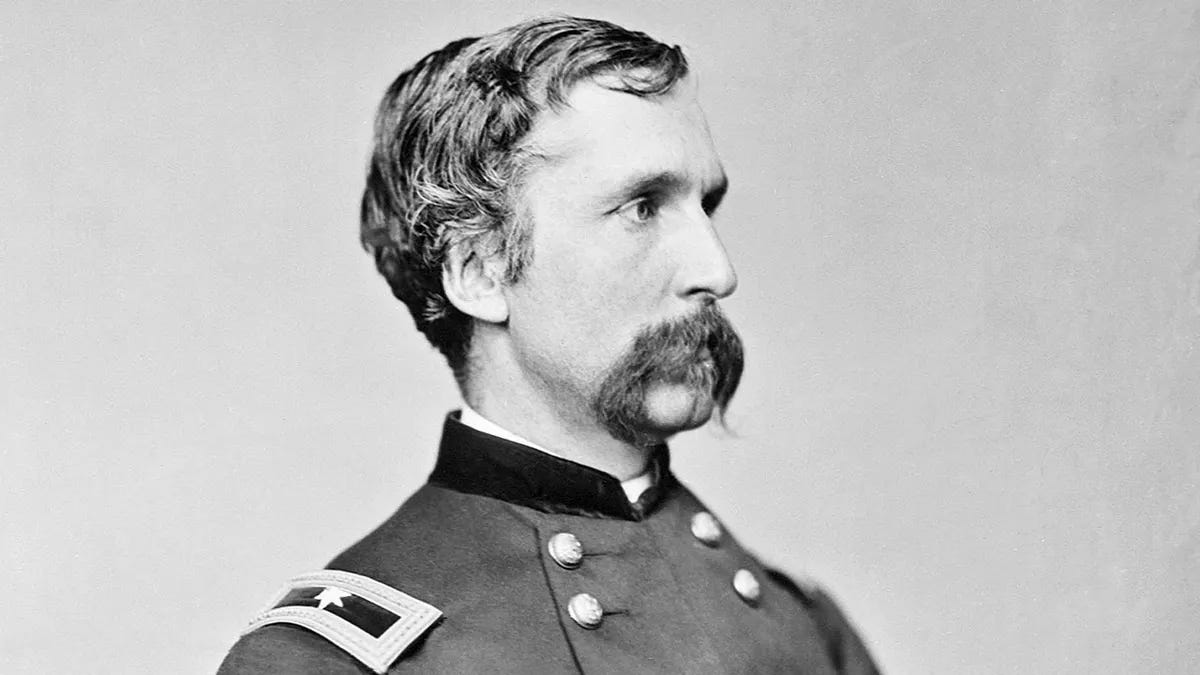Last week I had the honor of delivering the annual Joshua L. Chamberlain Memorial Lecture at the Pejepscot History Center in Brunswick, Maine. We had an incredible turnout of around 100 people for my talk on the history and controversy surrounding Civil War monuments.
Brunswick is a beautiful town, situated on the Androscoggin River. The major attraction is the beautiful Bowdoin College campus.
Regardless of where you go while in town, it’s hard to miss reminders of the town’s favorite son. Joshua L. Chamberlain both graduated and served as Bowdoin College’s sixth president. He served as governor of Maine from 1867 to 1871, but most people know Chamberlain as the colonel of the 20th Maine and “Hero of Little Round Top.”
During my visit last week I made time to take a tour of Chamberlain’s newly restored home. Millions of dollars have been poured into the home’s restoration over the past few decades, which attracts visitors from all over the country.
While walking through the home I couldn’t help but reflect on the vagaries of memory or even the role of luck in shaping the types of events and individuals that we remember and even celebrate.
Chamberlain’s war record is certainly worthy of our attention, but it is safe to say that without Michael Shaara’s pulitzer-prize winning work of historical fiction, The Killer Angels, published in 1974, it is unlikely that most people would ever have heard of him.
The book certainly captured my imagination when I first read it over twenty years ago:
Chamberlain raised his saber, let loose the shout that was the greatest sound he could make, boiling the yell up from his chest: Fix bayonets! Charge! Fix bayonets! Charge! Fix bayonets! Charge! He leaped down from the boulder, still screaming, his voice beginning to crack and give, and all around him his men were roaring animal screams, and he saw the whole Regiment rising and pouring over the wall and beginning to bound down through the dark bushes, over the dead and dying and wounded. . . .
The 1993 movie, Gettysburg, based on Shaara’s novel and directed by Ron Maxwell, solidified Chamberlain’s place in the Civil War pantheon. Chamberlain was ably played by actor Jeff Daniels.
At the end of the tour I asked our group how many learned about Chamberlain as a result of having read the book or seen the movie. Every hand was raised, including our guide.
Chamberlain certainly helped to put himself in a position where an author like Michael Shaara could find him. After the war, Chamberlain remained active among his fellow veterans and published, The Passing of the Armies, an account of his participation in the final campaign of the war in Virginia and the surrender of Lee’s army at Appomattox Court House.
In the spirit of reconciliation, Chamberlain maintained a close correspondence with William C. Oates, whose 15th Alabama Infantry Regiment attacked the 20th Maine’s position on the extreme left flank of the Union army at Little Round Top late in the afternoon of July 2, 1863. Chamberlain even supported Oates’s efforts to place a historical marker on the Gettysburg battlefield at the regiment’s furthest advance at Little Round Top, though the two differed over where that position was located.
Both the book and movie attracted new generations of Civil War enthusiasts and fans of Chamberlain specifically. Walk into any shop on Steinwehr Avenue in Gettysburg and you can find Chamberlain’s face on any number of products, from t-shirts to shot glasses and everything in between.
Even the Gettysburg battlefield itself was transformed by this resurgence of interest, especially after the movie. Few visitors took much of an interest in the position of the 20th Maine before the movie, but plenty now flock to the site to retrace Chamberlain’s steps, along with his fiction sidekick, Buster Kilrain.
New and improved paths now make the short walk from the parking lot on Little Round Top to the 20th Maine’s monument much easier for visitors to the battlefield.
Popular memory of Chamberlain has clearly benefited from the attention of Shaara and Maxwell, but with that comes the inevitability that his star will eventually fade again.
Such is the nature of historical memory.







I thought a lot about the vagaries of historical memory, too, when I wrote Delivered Under Fire. Even now, it’s hard for me to understand how Absalom Markland has been essentially wiped from the historical record despite his close relationship with Grant and Sherman. It makes me want to look more closely at those who are on the perimeters of “great man” history.
Outside of my studies in history the first time I encountered Chamberlain was in company grade office PME in the 1980s. The Army was using story telling, specifically biography, to teach lessons about officer development. As I remember this stuff was professionally done by one of the departments in the school at Ft Leavenworth. Chamberlain was presented as the quintessential citizen soldier leader. Someone not trained in the military art but intelligent and analytic and able to make decisions. In reality there was probably more to the Chamberlain lesson but this was all a long time ago. Much of his story focused of course on Gettysburg. I don’t remember anything being said about his post-war career other than a very superficial overview. The Gettysburg movie and subsequent issues over the Little Round Top fight prompted me to go back many years latter and look more deeply at Chamberlain